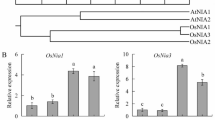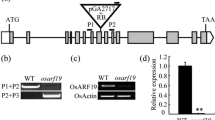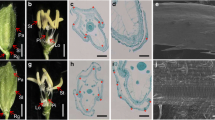Abstract
Heading date is one of the important agronomic traits that affects rice yield. In this study, we cloned a new rice B3 family gene, OsL1, which regulates rice heading date. Importantly, osl1-1 and osl1-2, two different types of mutants of OsL1 were created using the gene editing technology CRISPR/Cas9 system and exhibited 4 days earlier heading date than that of the wild type under short-day conditions. Subsequently, the plants overexpressing OsL1, OE-OsL1, showed a 2-day later heading date than the wild type in Changsha and a 5-day later heading date in Lingshui, but there was no significant difference in other yield traits. Moreover, the results of subcellular localization study indicated that OsL1 protein was located in the nucleus and the expression pattern analysis showed that OsL1 gene was expressed in rice roots, stems, leaves, and panicles, and the expression level was higher at the root and weak green panicle. In addition, the OsL1 gene was mainly expressed at night time under short-light conditions. The transcriptomic analysis indicated that OsL1 might be involved in the Hd1-Hd3a pathway function. Together, our results revealed that the cloning and functional analysis of OsL1 can provide new strategy for molecular design breeding of rice with suitable fertility period.







Similar content being viewed by others
Data availability
The data that support the findings of this study are available from the corresponding author upon reasonable request.
References
Castillejo C, Pelaz S (2008) The balance between CONSTANS and TEMPRANILLO activities determines expression to trigger flowering. Curr Biol 18(17):1338–1343. https://doi.org/10.1016/j.cub.2008.07.075
Chai JT, Zhu SS, Li CN, Wang CM, Wan JM (2020) OsRE1 interacts with OsRIP1 to regulate rice heading date by finely modulating Ehd1 expression. Plant Biotechnol J 19:2300–2310. https://doi.org/10.1111/pbi.13462
Deng Y, Song SS, Wang TK, Li YX, Zhao XL, Li L, Liu JF (2018) Preliminary analysis on function of gene OsD1 related to rice panicle development. Hybrid Rice 33(05): 44–50+58. https://doi.org/10.16267/j.cnki.1005-3956.20180201.044.
Doi K, Izawa T, Fuse T, Yamanouchi U (2004) Ehd1, a B-type response regulator in rice, confers short-day promotion of flowering and controls FT-like gene expression independently of Hd1. Genes Dev 18(8):926–936. https://doi.org/10.1101/gad.1189604
Drishti M, Saptarshi D, Giridhar R, Kumar MP, Ronita NC (2023) RAV1 mediates cytokinin signalling for regulating primary root growth in Arabidopsis. Plant J 113(1):106–126. https://doi.org/10.1111/tpj.16039
Guo XL, Hou XM, Fang J, Wei PW, Xu B, Chen ML, Feng YQ, Chu CC (2013) The rice GERMINATION DEFECTIVE 1, encoding a B3 domain transcriptional repressor, regulates seed germination and seedling development by integrating GA and carbohydrate metabolism. Plant J 75(3):403–416. https://doi.org/10.1111/tpj.12209
Hu HM, Tian S, Xie GH, Liu R, Wang NN, Li SS, He YH, Du JM (2021) TEM1 combinatorially binds to FLOWERING LOCUS T and recruits a Polycomb factor to repress the floral transition in Arabidopsis. Proc Natl Acad Sci USA 118(35):e2103895118. https://doi.org/10.1073/pnas.2103895118
Ishikawa R, Aoki M, Kurotani K, Yokoi S, Shinomura T, Takano M, Shimamoto K (2011) Phytochrome B regulates heading date 1 (Hd1)-mediated expression of rice florigen Hd3a and critical day length in rice. Mol Genet Genomics 285(6):461–470. https://doi.org/10.1007/s00438-011-0621-4
Itoh H, Nonoue Y, Yano M, Izawa T (2010) A pair of floral regulators sets critical day length for Hd3a florigen expression in rice. Nat Genet 42(7):635–638. https://doi.org/10.1038/ng.606
Izawa T, Oikawa T, Sugiyama N, Tanisaka T, Yano M, Shimamoto K (2002) Phytochrome mediates the external light signal to repress FT orthologs in photoperiodic flowering of rice. Genes Dev 16(15):2006–2020. https://doi.org/10.1101/gad.999202
Izawa T, Mihara M, Suzuki Y, Gupta M, Itoh H, Nagano AJ, Motoyama R, Sawada Y, Yano M, Hirai MY, Makino A, Nagamura Y (2011) Os-GIGANTEA confers robust diurnal rhythms on the global transcriptome of rice in the field. Plant Cell 23(5):1741–1755. https://doi.org/10.1105/tpc.111.083238
James RT, Virginie V, Gael P, Fernando C, Zsolt K, Caroline M, Loï CL, Bertrand D, Zhou DX, Martine D (2019) Regulation of FUSCA3 expression during seed development in Arabidopsis. Plant Cell Physiol 60(2):476–487. https://doi.org/10.1093/pcp/pcy224
Jin JP, Tian F, Yang DC, Meng YQ, Kong L, Luo JH, Gao G (2017) PlantTFDB 4.0: toward a central hub for transcription factors and regulatory interactions in plants. Nucleic Acids Res 45(D1):D1040–D1045. https://doi.org/10.1093/nar/gkw982
Jing YJ, Guo Q, Lin RC (2019) The B3-domain transcription factor VAL1 regulates the floral transition by repressing FLOWERING LOCUS T. Plant Physiol 181(1):236–248. https://doi.org/10.1104/pp.19.00642
Kobayashi Y, Weigel D (2007) Move on up, it’s time for change mobile signals controlling photoperiod-dependent flowering. Genes Dev 21(19):2371–2384. https://doi.org/10.1101/gad.1589007
Komiya R, Ikegami A, Tamaki S (2008) Hd3a and RFT1 are essential for flowering in rice. Genes Dev 135(4):767–774. https://doi.org/10.1242/dev.008631
Komiya R, Yokoi S, Shimamoto K (2009) A gene network for long-day flowering activates RFT1 encoding a mobile flowering signal in rice. Development 136(20):3443–3450. https://doi.org/10.1242/dev.040170
Li L, Qiu MD, Dong H, Shen H, Song SS, Wang TK, Li YX, Zhang LH, Li L, Wang JL (2021) Analysis of bioinformatics and expression pattern of rice B3 transcription factor OsL1. Mol Plant Breed 19(15):4880–4886. https://doi.org/10.13271/j.mpb.019.004880
Nemoto Y, Nonoue Y, Yano M (2016) Hd1, a constans ortholog in rice, functions as an Ehd1 repressor through interaction with monocot-specific CCT-domain protein Ghd7. Plant J 86(3):221–233. https://doi.org/10.1111/tpj.13168
Pawel M, Philip W, Tiancong L, Mathias N, Franco EE, Zhu DL, Questa JI, Gerhard S, Carlo M, Caroline D (2022) VAL1 acts as an assembly platform co-ordinating co-transcriptional repression and chromatin regulation at Arabidopsis FLC. Nat Commun 13(1):5542–5542. https://doi.org/10.1038/s41467-022-32897-7
Peng LT, Shi ZY, Li L, Shen GZ, Zhang JL (2007) Ectopic expression of OsLFL1 in rice represses Ehd1 by binding on its promoter. Biochem Biophys Res Commun 360(1):251–256. https://doi.org/10.1016/j.bbrc.2007.06.041
Peng LT, Shi ZY, Li L, Shen GZ, Zhang JL (2008) Overexpression of transcription factor OsLFL1 delays flowering time in Oryza sativa. J Plant Physiol 165(8):876–885. https://doi.org/10.1016/j.jplph.2007.07.010
Roberto M, Antonio F, Maurizio T (2022) Proline affects flowering time in Arabidopsis by modulating FLC expression: a clue of epigenetic regulation. Plants 11(18):2348–2348. https://doi.org/10.3390/plants11182348
Shi YX, Min C, Rong P, Yidan O, Jialing Y (2015) OsEMF2b acts as a regulator of flowering transition and floral organ identity by mediating H3K27me3 deposition at OsLFL1 and OsMADS4 in rice. Plant Mol Biol Report 33(1):121–132. https://doi.org/10.1007/s11105-014-0733-1
Shoko K, Yuji T, Yasushi K, Lisa M, Takuji S, Takashi A, Masahiro Y (2002) Hd3a, a rice ortholog of the Arabidopsis FT gene, promotes transition to flowering downstream of Hd1 under short-day conditions. Plant Cell Physiol 10:1096–1105. https://doi.org/10.1093/pcp/pcf156
Sun B, Zhan XD, Lin ZC, Wu WX, Yu P, Zhang YX, Sun LP, Cao LY, Cheng SH (2017) Erratum to: Fine mapping and candidate gene analysis of qHD5, a novel major QTL with pleiotropism for yield-related traits in rice (Oryza sativa L.). Theor Appl Genet 130(1):247–258. https://doi.org/10.1007/s00122-016-2821-0
Sun B, Kumar BK, Song PZ, Ashleigh E, Louise P, Valdeko K, Anko B, Ulla D, Vandasue R, Daniel S, Yang JB, Jia GF, Stephan W (2022) FIONA1-mediated methylation of the 3’UTR of FLC affects FLC transcript levels and flowering in Arabidopsis. PLoS Genet 18(9):e1010386. https://doi.org/10.1371/journal.pgen.1010386
Suzuki M, Wang HD, McCarty DR (2007) Repression of the LEAFY COTYLEDON 1/B3 regulatory network in plant embryo development by VP1/ABSCISIC ACID INSENSITIVE 3-LIKE B3 genes. Plant Physiol 143(2):2543–2547. https://doi.org/10.1104/pp.106.092320
Tsukagoshi H, Morikami A, Nakamura K (2007) Two B3 domain transcriptional repressors prevent sugar-inducible expression of seed maturation genes in Arabidopsis seedlings. Proc Natl Acad Sci USA 104(7):902–911. https://doi.org/10.1073/pnas.0607940104
Turck F, Fornara F, Coupland G (2008) Regulation and identity of florigen: FLOWERING LOCUS T moves center stage. Annu Rev Plant Biol 59(1):573–594. https://doi.org/10.1146/annurev.arplant.59.032607.092755
Wang Y, Cao LM, Zhang YX, Cao CX, Liu F, Huang FK, Qiu YF, Li RB, Lou XJ (2015) Map-based cloning and characterization of BPH29, a B3 domain-containing recessive gene conferring brown planthopper resistance in rice. J Exp Bot 66(19):6035–6045. https://doi.org/10.1093/jxb/erv318
Wu WX, Zhang YX, Zhang M, Zhan XD, Shen XX, Yu P, Chen DB, Liu Q, Cheng SH, Cao LY (2018) The rice CONSTANS-like protein OsCOL15 suppresses flowering by promoting Ghd7 and repressing RID1. Biochem Biophys Res Commun 495(1):1349–1355. https://doi.org/10.1016/j.bbrc.2017.11.095
Yang J, Lee S, Hang R, Kim S, Lee YS, Cao XF, Amasino R, An G (2013) OsVIL2 functions with PRC2 to induce flowering by repressing OsLFL1 in rice. Plant J 73(4):566–578. https://doi.org/10.1111/tpj.12057
Yano M, Katayose Y, Ashikari M, Yamanouchi U, Monna L, Fuse T, Baba T, Yamamoto K, Umehara Y, Sasaki NT (2000) Hd1, a major photoperiod sensitivity quantitative trait locus in rice, is closely related to the Arabidopsis flowering time gene CONSTANS. Plant Cell 12(12):2473–2484. https://doi.org/10.2307/3871242
Yejin S, Chaemyeong L, Gayeong S, Yumin C, Kiyoon K, NamChon P (2022) The AP2/ERF transcription factor LATE FLOWERING SEMI-DWARF suppresses long-day-dependent repression of flowering. Plant, Cell Environ 45(8):2446–2459. https://doi.org/10.1111/pce.14365
Zhang ZY, Zhang BZ, Qi FX, Wu H, Xing YZ (2019) Hd1 function conversion in regulating heading is dependent on gene combinations of Ghd7, Ghd8, and Ghd7.1 under long-day conditions in rice. Mol Breed 39(7):1–12. https://doi.org/10.1007/s11032-019-1001-8
Zhang LC, Li YX, Wang TK, Qiu MD, Song SS, Dong H, Li L, Liu JF, Li L (2020) A preliminary study on the function of rice heading date gene OsDof6. Chin J Sci 34(5):397–405. https://doi.org/10.16819/j.1001-7216.2020.0211
Zhou S, Zhu S, Cui S, Hou H, Wan J (2020) Transcriptional and post-transcriptional regulation of heading date in rice. New Phytol 230(3):943–956. https://doi.org/10.1111/nph.17158
Acknowledgements
We thank Yuelu Mountain Seed Industry Innovation Project (No. 2021NK1002) for funding support.
Funding
This study was supported by Yuelu Mountain Seed Industry Innovation Project (No. 2021NK1002), Huxiang Youth Talent Project (No.2020RC3069), Changsha Outstanding Innovative Youth Project (No. kq2107019), and the Changsha Science and Technology Project (No. kq2004053).
Author information
Authors and Affiliations
Contributions
Conceptualization and validation were done by YL and LZ, while formal analysis was performed by TW and HD. The investigation was carried out by YQ and SX, and MG and MQ provided the necessary resources. Data curation was performed by LL, and the original draft was prepared by LL. LL reviewed and edited the manuscript. Project administration was handled by SS and LL, while LLi and JW acquired the funding. All authors have read and agreed to the published version of the manuscript.
Corresponding authors
Ethics declarations
Competing interests
The authors declare no competing interests.
Additional information
Publisher's Note
Springer Nature remains neutral with regard to jurisdictional claims in published maps and institutional affiliations.
This article is original.
Supplementary Information
Below is the link to the electronic supplementary material.
Rights and permissions
Springer Nature or its licensor (e.g. a society or other partner) holds exclusive rights to this article under a publishing agreement with the author(s) or other rightsholder(s); author self-archiving of the accepted manuscript version of this article is solely governed by the terms of such publishing agreement and applicable law.
About this article
Cite this article
Li, L., Qiu, M., Song, S. et al. Loss of function of OsL1 gene cause early flowering in rice under short-day conditions. Mol Breeding 44, 17 (2024). https://doi.org/10.1007/s11032-024-01444-1
Received:
Accepted:
Published:
DOI: https://doi.org/10.1007/s11032-024-01444-1




